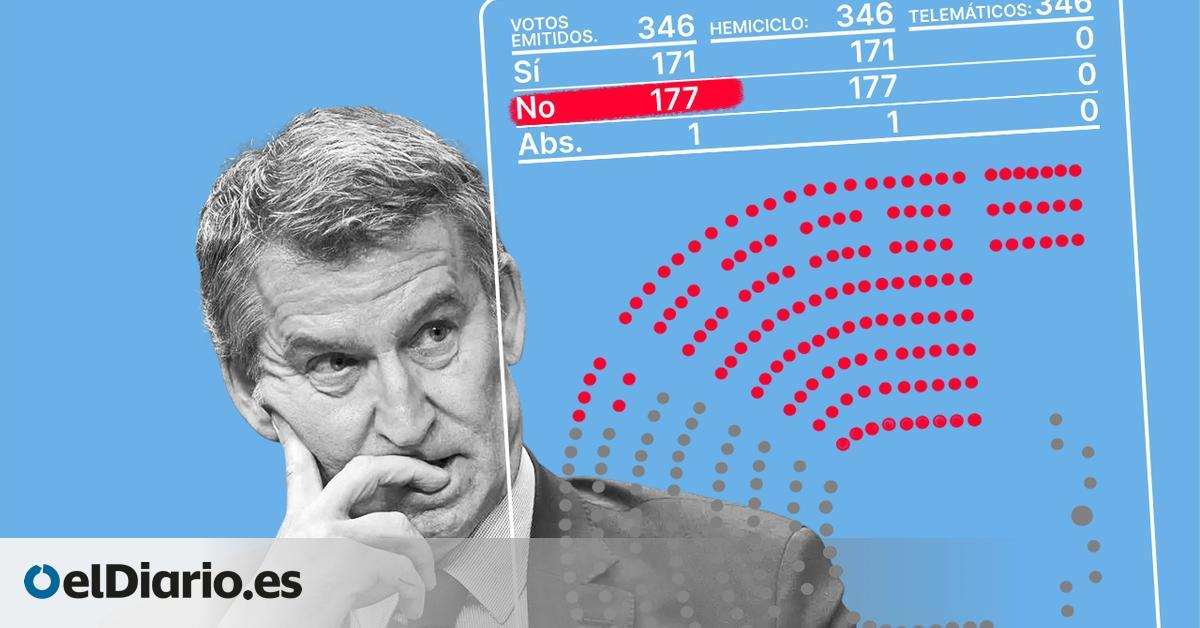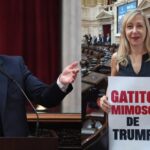
The PP has a new dilemma: the plan of 14,000 million euros that the government has designed to try to alleviate the crisis derived from the tariff war promoted by the US president, Donald Trump, and the consequences that he may have on workers and companies. Alberto Núñez Feijóo is discussed between exercising state party and supporting policies that demand important sectors of the country to an external aggression or taking a slice of the parliamentary weakness of the government and contributing to a parliamentary defeat, which in this case is not safe. Always under the threat of Vox, willing to attack everything that comes out of the Council of Ministers, but also to whom I dare to vote next to the PSOE, even if they are essential measures to deal with emergencies.
Behind the foci negotiations between popular and socialists continue: they are not broken but there is no agreement, the sources consulted, despite some messages thrown by the PP that could imply their vote against.
On Monday, in his last public appearance, Feijóo himself stressed that there was no “news” regarding his rejection of the Executive’s measures, because this “refuses to accept repeated proposals of the PP.” The Minister of Economy, Carlos Body, maintains, on the other hand, that some of those ideas have been accepted and that negotiation is maintained. Again, before another international crisis, the government does not guarantee the support of the first opposition party in a matter as sensitive as citizenship aid.
Conditioned by the frontal opposition of the extreme right to any government plan, Feijóo has also signed up for ‘is not’ in what goes from legislature and practically from its landing in the presidency of the PP. Despite promising a state opposition, the popular have systematically voted against all Moncloa decrees to save crisis situations. Feijóo thus prioritizes the parliamentary defeats of the government, even in sensitive issues for citizenship, while their party fantasizes with the end of the legislature every time the Executive loses a vote. But Sánchez, meanwhile, insists that he will exhaust the legislature and that he will not call elections until 2027 despite the complicated scenario to achieve majorities.
The plan against the tariffs approved by the Council of Ministers on April 8 and that in the coming weeks will pass through Congress reaches the figure of 14,100 million euros in aid, of which 7,400 will be of new financing and 6,700 of existing instruments. Contemplates an ICO line of guarantees of 5,000 million “to flow the credit through financial entities” to the sectors affected by the commercial war. And add another ICO line of financing for 1,000 million for the renewal of the MOVES III Plan for 400 million, the creation of the Productive Industrial Investment Fund for 200 million and the network mechanism. In a second axis, the active plan “financial instruments to support internationalization” of companies for 720 million. In addition, it designs coverage of 2,000 million through the CESCE and CARI institutions. Finally, displays the ICEX Internationalization Plan with funds from the recovery plan (5,000 million).
After a few hours of hesitation in the PP, where its parliamentary spokesman, Miguel Tellado, came to ask that an eventual support to the Spaniards not be confused with doing the government’s follow -up, the PP left in the air the endorsement to that package of measures invoking Sánchez’s agreements with Junts, which is the wild card that the popular uses every time they want to get off of any government plan.
Then he pointed out that he cannot support the Executive because, in his opinion, his plan is “a patch.” Without concretions, Feijóo limits himself to asking for “structural reforms” and “not changing the name of budget items”, and bases his proposal on combining financial aid with permanent tax sales and prolonging the useful life of nuclear power plants.
This dynamic of alternating arguments or excuses to reject the decrees of government aid has been repeated again and again since Feijóo was made with the reins of the PP, in 2022. One of the most famous ‘Noes’ of the main opposition party occurred this January, when the interests of the conservative formation and together were aligned. Both forces knocked down a Bus Decree that included such important measures for citizens as the annual revaluation of pensions and public transport aid.
“The blackmail” of the PNV that the PP ended up supporting
Then the major PNA of the PP – it made the spokesman in Congress, Miguel Tellado – argued that his ‘no’ was due to the fact that the text included the return to the PNV of a palace in Paris that was acquired at the beginning of the century by leaders of the nationalist formation, but that it was subtracted by the Nazi regime when France invaded and, later, it was subsequently delivered by German to the dictatorship Francoist
The perplexity of a part of the PP to what had done its direction lying a text that was in favor of the interests of pensioners and workers made the Feijóo team to overact and talk about “a gift” to the PNV and even a “blackmail” of the nationalist and independent forces to the Sanchez team. Genoa 13 came to launch bulos as the decree included VAT increases to food or electricity, two aspects that were not even mentioned in the text. All these arguments vanished just a few weeks later when, after days of internal and external pressures, the PP did support an identical decree in Congress that also collected the return of the controversial Parisian palace to the PNV. “They do not deserve anyone’s confidence, but the Spaniards are not guilty of the lack of integrity of the government,” the PP then argued to justify their striking change of mind in just a few hours, as soon as they saw that the vote was going to have a majority thanks to the support of Junts.
A year earlier, in January 2024, Feijóo and his 137 deputies also voted ‘no’ to a huge package of social measures. During one of the most important plenary sessions of the Legislature, the PP first rejected a royal decree of anti -crisis measures that, however, was approved thanks to the support of the parties that facilitated the investiture of Sánchez. The text depended on measures that directly hit the pocket of millions of people. First, the rise in pensions of 2024 for more than nine million pensioners, 3.8% in a general and higher way (between 5% and 7%) in the case of minimum and non -contributory. The standard also established the maximum pension, the increase in the complement against the gender gap, as well as other relevant measures from the point of view of financing, such as the increase in the quota of the intergenerational equity mechanism (MEI), for the piggy bank of pensions, and of what the highest wages are quoted.
Together with pensions, the 6.9% increase in the minimum vital income (IMV) was also regulated, another initiative to which the PP said ‘no’. And it also rejected more labor measures such as autonomous aids, in the quotas and cessation of activity, by the volcano of La Palma, also the ERTE specific by the climatic crisis and the so -called “prohibition of dismissing” objectively for the energy crisis or for the consequences of the war of Ukraine. Feijóo also opposed the extension of the most advantageous conditions of partial retirement and the relief contract in the manufacturing industry, as well as the discounts to the transport of the usual users, the prohibition of the evictions of all the people who were in a situation of vulnerability, the aid to vulnerable consumers for heating and the light or the reduction of the VAT of the basic foods.
Against aid and subsidies
In that first plenary session of 2024 the PP also rejected another decree for the modernization of justice that included a new salary complement to officials or the creation of a new remuneration that allowed officials to rise wage without changing jobs. The text, however, also went ahead with most of the investiture. The same PP that makes the tax decrease its main flag opposed that same decree that collected to expand the fiscal relief that applied for donations to non -profit entities included in the patronage rules, as well as changes in terms of entities that could benefit from not paying for the company tax, by incorporating those responsible for socio -labor insertion of people at risk of social exclusion Education of people with high capacities.
Feijóo also voted ‘no’ to another royal decree, that of the reform of unemployment subsidies, which in this married did decrease because the rejection of PP and Vox also joined Podemos. Among the most outstanding measures of this standard were: the increase in the amount of the subsidy to 570 euros per month (from the current 480 euros), the elimination of the waiting month between the benefit and the subsidy, the possibility of making a job compatible and collecting part of the subsidy, as well as the protection of new groups – men of 45 years without family and eventual agricultural charges – while others (people out of prison extraordinary unemployment) were extinguished and referred to the minimum vital income. Another of its elements – which was the one that dicked the ‘no’ of Podemos – consisted of the progressive reduction of what quotes the subsidy for over 52 years: 125% of the minimum base (determined by the minimum wage) to 100% of this in 2028. The vote of the PP also contributed to annul Accumulate breastfeeding permit in full days or the possibility of compatible the unemployment subsidy with training practices.
Shortly after arriving at the front of the PP, Feijóo also did not want to contribute to the approval of the Royal Decree of measures against the economic crisis caused by inflation, before which the popular abstained, in July 2022, although it came forward with more ‘yes’ than ‘noes’. The standard included measures of broad social draft such as the limitation of the upload of rentals or other rise in the IMV, in addition to the sales to public transport, a 5% reduction in the VAT of electricity, freezing of the price of the butane bottle and a 200 euros check for lower income families.
When he landed in Madrid, in April 2022, after accumulating four absolute majorities in Galicia, Feijóo wanted to present himself as a consensus leader and Adalid of moderation. But since then, in addition to multiplying disqualifications against the left with the same style as Vox – with which he competes for the same electorate and who depends in communities and municipalities – the PP has opposed all the government’s social decrees and has discarded the idea of talking about state agreements, which became a daily life in its first months leading the PP. But since then it has only agreed with the Government the renewal of the General Council of the Judiciary (CGPJ) last July, and after five years of blocking by the PP, and the renewal of the State Pact against Gender Violence, last February.
Source: www.eldiario.es

